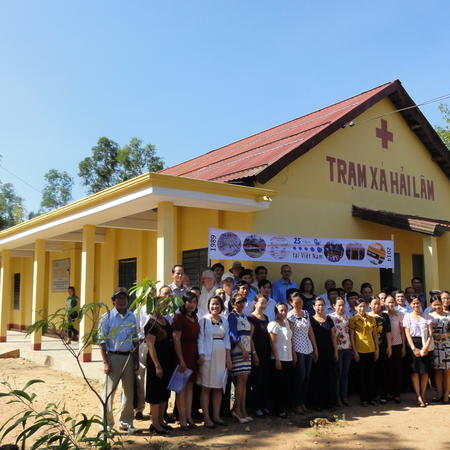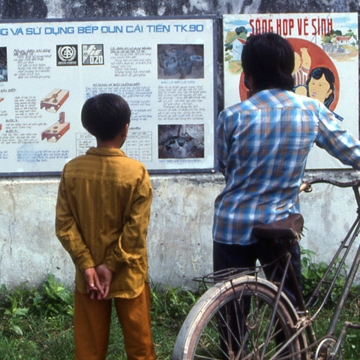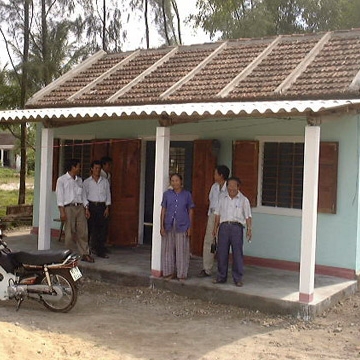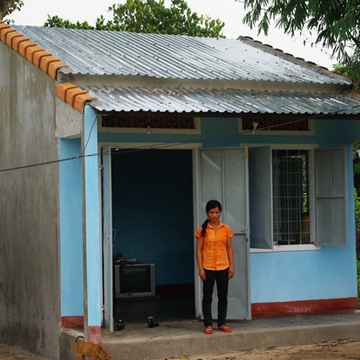- English
- Français
- Tiếng Việt
Women Potters in Burkina Faso
Helping women potters in West Africa save 90% energy and make a better living
Nearly every small dusty village in northern Burkina Faso is home to one or more small groups of female potters. These hard working women produce the ceramic water jars, the pots to store food and other objects, and the traditional tubular gutters used on flat mud roofed houses. Selling their surplus is a vital complementary source of income, bringing in much needed cash in the harsh dry season and helping stave off starvation for the family. Pottery is one of the very few economic activities available to women, as they can fit it round collecting water (often over long distances), working in the fields and their daily household chores, working at home.
Wasted energy, wasted effort
Traditionally, pottery is not turned on a potter’s wheel, nor fired in a kiln. To make an almost spherical pot, for example, the clay is beaten into shape using a shallow curved indentation in the ground as a mould. Once enough pots are dry, they are placed in a shallow open pit, where thirty or more pots and other objects will be fired together. Dried cow dung, some wood, bark and branches – anything that will burn - is simply piled round and over the pots and set alight. Most of the heat generated escapes to the open air and a gust of wind suddenly changing the temperature in the pit makes the pottery crack or causes unsightly discolouring.
This system of firing is a huge waste of energy and effort. The women are given a hard time gathering cow dung since the farmers want it to fertilize their fields and wood is now very scarce. On top of which there is an high proportion of breakage – typically 25% - when the pit is raked clear and emptied.
The NGO Development Workshop has been working in the arid West African countries bordering the Sahara for over thirty years. Its main focus has been on training many hundreds of village builders to use earth vaults and domes so that they no longer need to cut down scarce trees for roofs. Noticing the very uneven quality of the clay gutters used to channel water away from these “woodless” roofs, DW suggested that village builders should try building simple mud brick vaulted kilns for the women potters. The results exceeded all expectations on a number of levels.
Ten years after the first kiln went up, over 850 women in 35 villages have seen for themselves dramatic improvements in output, in quality – and above all in their income.
Figures.
Using the traditional open-firing method, a load of 60 pots weighing 235 kilos required 7 cartloads of fuel, and on average more than 25% of the products were broken. Using a closed kiln, a load of 148 pots weighing 670 kgs needs only half a cartload of fuel and the breakage rate is less than 3%. That’s a 93% saving in fuel for a 70% increase in saleable output. Why? Because the kiln is completely sealed once the products have been put into the chamber, so there is very little heat loss and no risk of wind causing sudden temperature fluctuations. In addition, after the firing the women can recuperate about 7.5 kgs of charcoal, which they either sell or use for their own cooking needs representing a local market value of more than €6.
And thanks to the better quality of the products, they command a higher price on the local markets. A pot that sold before for €1.20 now sells for €1.90, that’s 60% more.
DW has also helped women acquire new skills, using a potter’s wheel as well as the new kilns. With less risk of breakage they are able to make new products that were impossible before. They have added new forms of gutters, terracotta floor tiles, ceramic “bells” for housing baby chicks and more besides. With so much less fuel to find they can increase the number of firings and they can also now work through the rainy season. And demand for their higher quality products has gone up enabling them to increase their prices.
As a result of all these factors, they are earning significantly more than they have ever done before, so that they do not have to spend as much time on back-breaking work in the fields under the heat of the sun. The kilns have literally changed their lives and they appreciate that.
How you can help change their lives
No surprisingly, DW has a long waiting list of groups of women asking for kilns and the new equipment they need for making tiles and turned pots. We simply do not have the resources to provide these. We need your help so we can help 40 more women’s groups.
To provide a group of ten women with a kiln, several potter’s wheels, two terracotta tile making kits and gutter moulds, and to ensure they are properly trained in how to use them most efficiently costs €2,000 – or just €200 per woman.
A small investment compared with providing them with a regular income for life and with skills they can pass on to their children.











